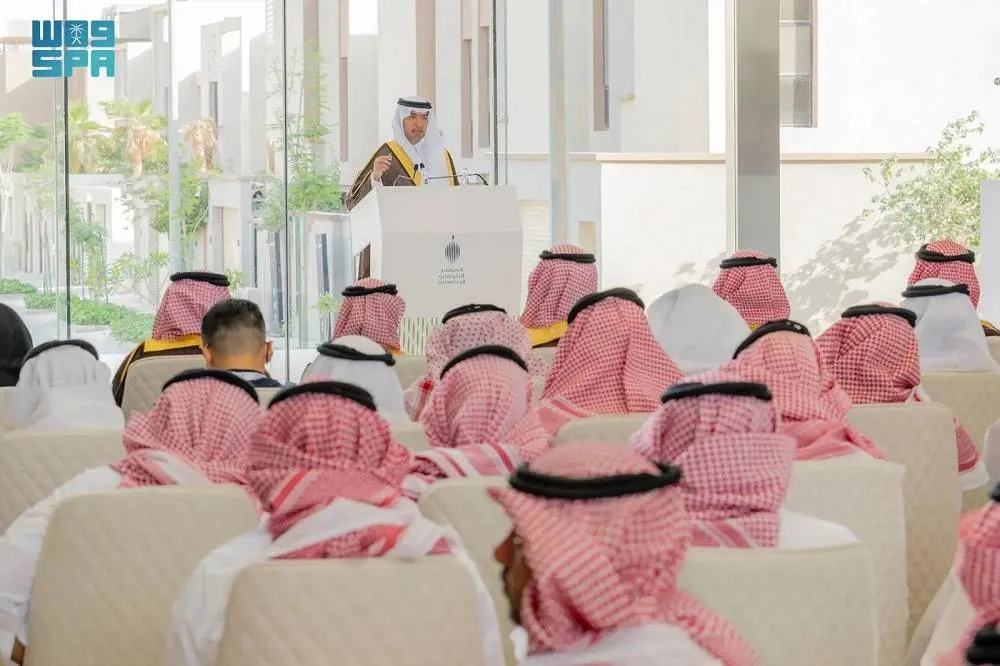Saudi Arabia is intensifying efforts to meet housing demands as part of its Vision 2030 goals in a continued push to provide stability and prosperity for citizens.
Minister of Municipal and Rural Affairs and Housing Majed Al-Hogail announced plans to introduce 70,000 new residential units in Riyadh, with prices starting from SAR 250,000 ($66,000). The move is aimed at increasing home ownership and providing affordable housing options across the Kingdom.
Al-Hogail emphasized the significance of Crown Prince Mohammed bin Salman’s recent donation of SAR 1 billion to support home ownership, describing it as a clear reflection of the leadership’s prioritization of the housing sector. The donation, he noted, will help boost the registration of new housing units for eligible families in 2025.
Speaking during a joint government press conference alongside Minister of Media Salman Al-Dosary, Al-Hogail highlighted the progress achieved under Vision 2030. According to the 2024 Vision Progress Report, the homeownership rate among Saudi families rose to 65.4% last year, up from 47% in 2016.
He noted that the ministry has launched over 11 financial solutions and revamped support programs to be more flexible and equitable. This has enabled more than 850,000 families to own homes, surpassing the targeted ownership rate of 65% a year ahead of schedule. The next milestone is to reach 70% homeownership by 2030.
The minister also revealed that over 50,000 housing units have been provided for families most in need, with more than 43,000 of them now owning homes. These efforts are part of broader goals to enhance quality of life and support vulnerable groups.
“Our goal is to make the journey to homeownership shorter and easier,” Al-Hogail said, adding that urban planning will be guided by local and regional development needs.
In Riyadh alone, between 60,000 and 70,000 new units will be delivered to meet growing demand. He stressed that prices will remain affordable and emphasized the importance of local job creation and economic stimulation in the process.
The housing and municipal sectors currently contribute 14% to Saudi Arabia’s GDP, spanning over 550 types of activities. Over the past few years, more than 500,000 jobs have been created through 318,000 enterprises operating under the ministry’s supervision. The real estate sector’s market size has grown significantly, from SAR 170 billion to over SAR 850 billion in 2024.
Al-Hogail also noted that the construction and real estate sectors account for more than 16% of total foreign direct investment, reflecting investor confidence in the country’s cities and regulatory environment. Municipal sector revenues surged from SAR 6.3 billion in 2020 to 22 billion in 2024, driven by better investment in available opportunities.
More than six Saudi cities have now been classified as smart cities, and the ministry plans to implement urban identity programs in 12 municipalities by the end of the year.
For his part, Al-Dosary praised Vision 2030 as an inspiring global model, stating it has “outpaced both time and numbers,” with achievements arriving ahead of schedule.
He described the vision as “the greatest success story of the 21st century,” adding that 2024 marked a year of record-breaking accomplishments. Among them: AlUla became the first Middle Eastern destination to earn certification from the International Organization of Sustainable Tourism Destinations, while the Saudi Virtual Health Hospital entered the Guinness World Records and seven Saudi hospitals were ranked among the world’s top 250.



